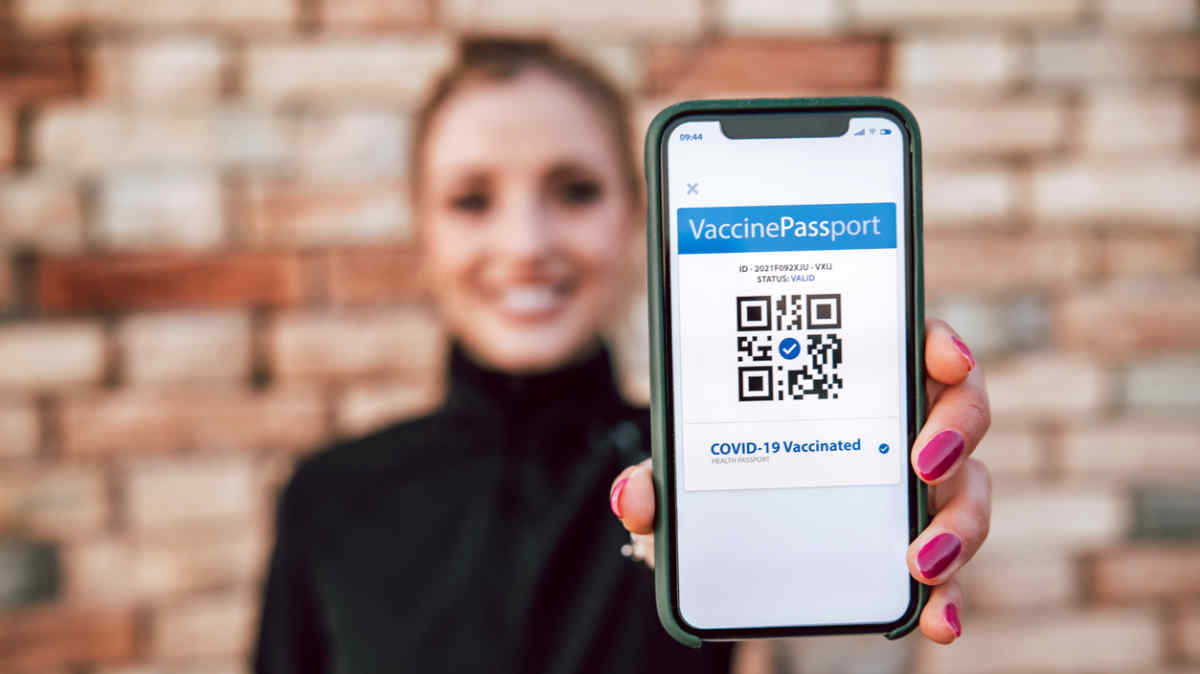Egypt and countries around the globe are adopting markedly different approaches to vaccine passports, affecting travel in various ways.
As countries begin to emerge from the thick of the pandemic, despite the omicron variant, there is a breadth of policies that both complicate and, in many instances, alleviate international travel restrictions.
Accordingly, internationally recognized proof of vaccination (vaccine passports) is central to any discussion of how and to what extent a country will reopen to visitors. However, there is little to suggest there will be a one-size-fits-all approach. What is certain, though, is that such documents are key to revitalizing the tourism sector in countries that mandate those passports from foreign visitors.
Safe Egypt
Egypt currently offers a printed paper in English and Arabic with a QR code to affirm its holder has been vaccinated for travel anywhere. It also provides a similar document in Arabic only for a significantly lower fee than the bilingual version to anyone vaccinated. The latter is suitable for traveling to Arabic-speaking countries only as well as accessing local offices that restrict entry to only vaccinated visitors.
The Ministry of Health and Population said it’s adopting a ‘traffic light’ vaccine passport system — red for unvaccinated, yellow for one dose, and green for two doses — which is currently limited to the healthcare sector. That scheme is in collaboration with the Ministry of Communication and Information Technology, which announced in October that Egyptian travelers could use the health passport for international trips to prove their vaccination status. QR codes are on the smartphone app and paper documents to make forgeries or tampering more difficult.
However, with the economy relying on inbound tourism and FDI for much-needed foreign currency, the government focuses more on vaccinating residents to promote itself as a safe destination. Egypt has vaccinated about 19% of its 100-million-plus population with at least one dose, as of Dec. 29, according to government statistics. That lags behind most European and Asian nations.
The first step to promoting Egypt as a safe destination for inbound visitors, particularly tourists, was in May, when the government rolled out a vaccination program specifically for tourism and hospitality workers. To ensure other sectors don’t cause a national outbreak that could keep international visitors away, the government on Nov. 15 said all civil servants must be vaccinated to enter their workplaces, including airports. Starting 2022, the government will mandate vaccines for all adults and open them for teenagers aged 15 and above.
The government also requires vaccine passports and testing of all inbound visitors to ensure it doesn’t suffer an outbreak that could cripple the economy in 2022.
Those efforts should reflect positively on the tourism industry first and foremost. Before the pandemic, in 2019, Egypt’s tourism industry brought in a record $13 billion after the arrival of more than 13 million tourists. This peak came after years of decline following a Russian jetliner crash in Sinai in October 2015 and an EgyptAir crash in May 2016.
In November, Ahmed Shafiq, reporting for Xinhua News, said Egypt is targeting “revenues of $6 billion to $9 billion in tourism and hopes to receive more than 6 million tourists.” In the first half of 2021, he reported that 3.5 million tourists visited the country, while the total revenues were about $4 billion.
Speaking to Gulf News in November, Lamia Kamal, assistant minister of tourism and antiquities for marketing and promotion, said post-pandemic tourism had become a high priority for the government.
“Tourism [constitutes] a quick win for us,” she said. “We have the destinations to attract tourists. We have the experience of the people working in this industry. We have the heritage. We have two-thirds of the antiquities of the world. We have warm weather; 365 days a year, we have the sun.
“We are 110 million people, but our [COVID-19] numbers are minimal compared to our population. We’ve also had almost zero tourists getting COVID in Egypt. If any tourist gets COVID, we give those free accommodations, free medication, and free hospitalization.”
Since July, Egyptian hotels have been running at 70% capacity due to COVID-19 regulations. However, since November, the government has allowed them to operate at full capacity.
Attracting visitors
Like Egypt, the UAE has been focusing inward to promote itself to international visitors as a safe destination. Dubai and Abu Dhabi are central business, investment, and entertainment hubs in the MENA region and the Near East. Accordingly, nearly 99% of the population has received at least one dose of a COVID-19 vaccine, according to the country’s National Emergency Crisis and Disaster Management Authority (NCEMA).
In December, the Emirates placed first in the Bloomberg News chart, with high vaccination rates and increased air travel among the key factors, wrote Sarah Forster for The National. To maintain its status as a safe destination for foreign travelers, the UAE requires proof of vaccinations for all live events.
That has resulted in tourism in the Emirates being back in full swing. The recent Top 100 City Destinations Index 2021 produced by U.K. market research company Euromonitor International placed Dubai first regionally and second globally, wrote Patrick Ryan in The National last month. Only Paris finished above Dubai, with Amsterdam, Madrid, and Rome rounding out the top five.
The index analysis praised the emirate “for being open to tourists since the summer of 2020, despite the pandemic.”
U.S. open?
A Dec. 2 order by the Centers for Disease Control requires all travelers three years old and over arriving from other countries to show a negative COVID test within 24 hours of their flight or proof of recovering from COVID in the past 90 days. The new rules apply to every port of entry, and non-U.S. citizens are required to show proof of vaccination with the U.S.-certified vaccine.
The move is part of President Joe Biden’s plan to control the spread of the new omicron variant. In addition, the United States issued travel warnings to its citizens against flying to certain European nations, including Germany, Denmark, and France.
But according to Victoria Milko, writing for U.S. News & World Report, millions are still ineligible to travel to the United States despite being fully vaccinated. That is because “they might not have had shots recognized by the U.S. Food and Drug Administration (FDA) or the World Health Organization (WHO).”
Notable omissions from the FDA-approved list include the Chinese Sinovac and Russian Sputnik V vaccines, which the World Health Organization, Egypt and other countries recognize.
“[Those vaccines] will not all be evaluated in clinical trials with the necessary rigor,” said William Moss, the Johns Hopkins International Vaccine Access Center executive director. However, the U.S. does allow entry to people who got two doses of any “mix-and-match” combination of vaccines on the FDA and WHO lists.
With each state able to impose domestic travel restrictions of its own volition coupled with varying infection rates, states like California and Florida are adopting almost polar opposite approaches to proof of vaccines.
In California, when the Omicron variant surfaced, “new air travel restrictions, including for American citizens, established in response to the spreading omicron COVID-19 variant” went into effect on Dec. 6, according to the Center for Disease Control. On the flipside, Florida has no travel restrictions beyond those mandated by the Federal government as of Dec. 29.
Passports ++
However, having vaccine passports won’t be enough to travel to every country. For example, Austria, Australia, and New Zealand impose the most restrictive COVID-mitigation measures.
On Dec. 6, the Austrian government, headed by Chancellor Alexander Schallenberg, said that all non-residents must present a negative PCR test plus proof of vaccination with a certified vaccine.
However, tourists might still find it hard to visit the country. The government there imposed a total lockdown in mid-November. “Tourism in Austria has been put on hold and people are expected to stay at home,” wrote Karla Manson for the online blog Travel With Bender in December.
The government suspended inbound travel for touristic purposes at the time of publication.
The UK government has been increasingly cautious despite reaching an 80% vaccination rate without mandating it. It reintroduced in December travel restrictions in light of the omicron variant, including mandatory quarantines for travelers with proof of vaccination until they produce a negative PCR result.
Various travel associations estimate foreign visitor numbers will be down 75% during the holiday season, compared to the data from 2019, attributing the decrease to the spread of the Omicron variant and the resulting travel restrictions. On average, tourism businesses expect their revenue for 2021 to be 93% lower compared to 2019,” wrote Pat Hyland for TourismReview News last month.
How badly the sector will suffer could depend on which approach a country takes to limit COVID-19 infections. There will be clear winners and losers when it comes to assessing the relative efficacy of those approaches and their impact on tourism and international travel.







